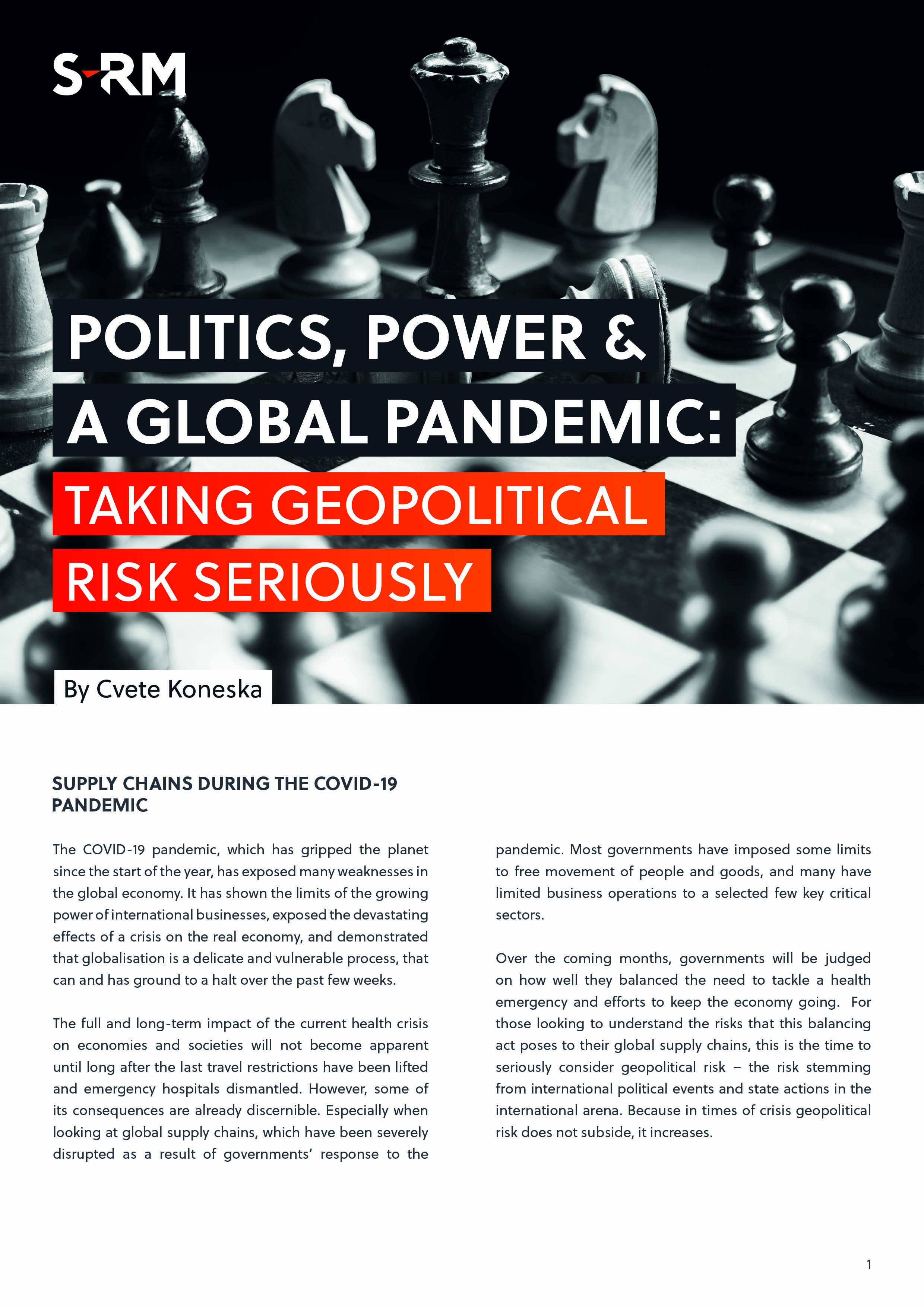Supply Chains During the COVID-19 Pandemic
The COVID-19 pandemic, which has gripped the planet since the start of the year, has exposed many weaknesses in the global economy. It has shown the limits of the growing power of international businesses, exposed the devastating effects of a crisis on the real economy, and demonstrated that globalisation is a delicate and vulnerable process, that can and has ground to a halt over the past few weeks.
The full and long-term impact of the current health crisis on economies and societies will not become apparent until long after the last travel restrictions have been lifted and emergency hospitals dismantled. However, some of its consequences are already discernible. Especially when looking at global supply chains, which have been severely disrupted as a result of governments’ response to the pandemic. Most governments have imposed some limits to free movement of people and goods, and many have limited business operations to a selected few key critical sectors.
Listen to the full interview here:
Over the coming months, governments will be judged on how well they balanced the need to tackle a health emergency and efforts to keep the economy going. For those looking to understand the risks that this balancing act poses to their global supply chains, this is the time to seriously consider geopolitical risk – the risk stemming from international political events and state actions in the international arena. Because in times of crisis geopolitical risk does not subside, it increases.
Over the coming months, governments will be judged on how well they balanced the need to tackle a health emergency and efforts to keep the economy going. For those looking to understand the risks that this balancing act poses to their global supply chains, this is the time to seriously consider geopolitical risk.
Below, we identify three key drivers of geopolitical risk to supply chains in the current environment: the renewed power of states, the precariousness of the global balance of power, and the instability of regional governance and peace. Each has the potential to undermine global supply chains.

States vs Big Business
The COVID-19 crisis shows that despite the growing power of multinational businesses over the past three decades, in the last instance power resides with the state. Consequently, in difficult times, states can and will use their powers in ways that disadvantage businesses. Despite the accelerating globalisation of business over the past few decades, since January both pro-business and pro-welfare governments have imposed restrictions on economic activity. And all businesses are affected and expected to comply.
As obvious as this might seem against the background of a global health emergency, it points to the limits of economic globalisation, which are not as clearly visible in ordinary times. During such times, Friedman’s ‘Dell Theory on Conflict Prevention’,[1] which claims that two economies will not fight if they form a part of the same complex supply chain, is generally valid. However, in times of emergency, states will take deliberate action that disrupts global supply chains, despite the high economic costs. In addition to these costs, further risks stem from the uncertainty around this precedent. How strictly is it going to be applied in future? Will countries use lockdown measures only during pandemics? Inevitably, some governments will be more likely to interpret this precedent more broadly than others, driving uncertainty for businesses.
Will countries use lockdown measures only during pandemics? Inevitably, some governments will be more likely to interpret this precedent more broadly than others, driving uncertainty for businesses.
Furthermore, the staggered nature of state responses to the COVID-19 outbreak will exacerbate the effects on supply chains. While China’s lockdown is gradually relaxed, supply chains are unlikely to recover soon. With restrictions now in place in Germany, the US and other large markets receiving goods and materials from China, supply chains are at risk of “reverse supply chain contagion.”[2] With limited coordination of state responses at the international level, this raises the threat of repeated supply chain disruptions over the next twelve months.
|
Supply chain contagions When China shut down Hubei province in January, the effects on global supply chains were felt elsewhere across the world. As the home of some of the largest global value chains, once Hubei was under lockdown, the resulting supply chain disruptions led to “contagion” in other economies globally, which suffered supply shocks. As China, and Hubei, gradually recover from COVID-19 and the government is lifting the restrictions on the economy, other large global economies, such as the US and the EU, are imposing restrictions on economic activity. This will likely lead to a “reverse contagion” of global supply chains, with reduced demand in these economies “re-infecting” China with further disruptions to trade and supply chains. |
GLOBAL RIVALRIES
The shifting balance of global power towards China (and the global East) is a common trope in debates on international politics. The growing economic power of China has been a key indicator of this shift over the past twenty years. The current crisis, or rather the state’s handling of it, may accelerate this shift. With the US and European governments being slow to adopt mitigation measures, their management of the pandemic appears less decisive to how Chinese authorities responded (despite their initial efforts to hide the details of the outbreak). The slow and ineffective response of Western democracies to the spread of the coronavirus may indicate a further weakness vis-à-vis China’s model. This may trigger further deterioration of US-China relations, which have been declining as a result of the recent trade wars between the two. Additional restrictions to trade, regulatory or physical border closures, will inevitably affect supply chains.
Cooperation during the COVID-19 crisis will shape regional and international governance in the coming months.
Cooperation during the COVID-19 crisis will shape regional and international governance in the coming months. The leadership of some Asian governments, such as South Korea and Singapore, which provided support to other nations as they faced the spreading pandemic, will bring legitimacy dividends, both domestic and international. Conversely, the hesitation and failure to coordinate within the EU may exacerbate the bloc’s existing problems, further weakening its clout in the global arena. These shifts could destabilise the current structures of international governance that provide the basis for global business operations. In the longer term, if new global powers seek to restructure international institutions and agreements, from the UN to the WTO, to reflect a potential new reality, the resulting uncertainty will increase risks for global business operations and the supply chains that sustain them.
Conflicts and unrest
The consequences of the almost complete freezing of the global economy during the COVID-19 pandemic will reverberate across the globe for several years. The situation of the most economically vulnerable populations and regions is likely to deteriorate, leading to an increased likelihood of domestic and cross-border conflict and unrest. Even in the relatively wealthy societies in Western Europe and North America, despite these governments’ generous economic stimulus packages, poverty and income inequality[3] are likely to grow, increasing the risk of social and political unrest.
In emerging markets and divided societies, particularly those with a combination of growing poverty and a state with a reduced ability to provide welfare and security, the risk of unrest and violent conflict is even higher. In long-standing conflict points in the Middle East, Africa and South Asia, hostilities and armed conflicts are likely to flare up, with international conflict management systems struggling to contain them. Armed conflict and instability pose substantial threats to global supply chains, disrupting and destroying supply routes and local economies. A new wave of conflict and unrest in the aftermath of the COVID-19-induced lockdown will likely compound the risks to supply chains, prolonging economic recovery and delaying the restoration of global value chains.
A new wave of conflict and unrest in the aftermath of the COVID-19-induced lockdown will likely compound the risks to supply chains, prolonging economic recovery and delaying the restoration of global value chains.
ACTIONABLE AWARENESS
Geopolitical risk is notoriously difficult to control. Few businesses will be able to influence the effects of volatile international relations and politics. In the wake of one of the largest health and economic crises in recent decades, it may appear as though geopolitics has ceased to matter, increasing the temptation to ignore geopolitical risk. But the COVID-19 pandemic has not always led to increased cooperation, it has also exposed persisting international rivalries and accusations with significant implications for organisations and their supply chains.
Yet translating awareness of geopolitical developments into business action is difficult. The sheer volume of available information and the pace at which it is released (and becomes outdated) is overwhelming and not all organisations have the resources or capabilities to track, sift through and analyse the implications for their revenue streams and supply chains. Since the start of the pandemic, we have encountered businesses taking a variety of approaches to keep abreast of, prepare for and respond to changes in the geopolitical landscape. Depending on the company’s available resources, these approaches have ranged from regular monitoring of publicly available data, travel advisories and political statements, all the way through to dedicated regional analysis teams supported by a global intelligence network. In each case, the most successful geopolitical risk analysis has been characterised by:
- A reliance on reputable, verifiable open source and/or human intelligence;
- A clear understanding of the geopolitical issues that matter most to the organisation and its supply chain;
- Prioritising the analysis of those issues in order of their business-criticality, in a disciplined manner, especially in cases where resources are limited; and,
- Translating this analysis into clear findings and practical recommendations for strengthening the organisation’s resilience to geopolitical change.
Therefore, although greater awareness and understanding of geopolitical developments may not provide organisations with the tools to control their associated risks, it will certainly help them decide how to act, to adapt and mitigate their impact on their global supply chains and operations.
References
[1] Friedman, T. L. (2005). The World is Flat: A Short History of the 21st Century. New York: Farrar Straus Giroux.
[2] Baldwin, R. (2020, April 1). Supply chain contagion waves: Thinking ahead on manufacturing ‘contagion and reinfection’ from the COVID concussion.
[3] Vos, R., Martin, W., & Laborde, D. (2020). How much will global poverty increase because of COVID-19? International Food Policy Research Institute.




 Email Cvete
Email Cvete




 @SRMInform
@SRMInform
 S-RM
S-RM
 hello@s-rminform.com
hello@s-rminform.com

